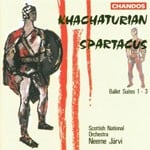Spartacus
(Spartakus) - Suite No. 1 from the ballet (1950-54, rev.1960/68)3(III=picc).2.corA.2.bcl.2-4.4.3.1-timp.perc:tgl/tamb/SD/BD/cyms/tam-t/tubaphone/glsp/xyl-hp-cel-pft-str
Abbreviations (PDF)
VAAP
1.Introduction and Dance of the Nymphs 2.Introduction and Adagio of Aegina and Harmodius 3.Variation of Aegina and Bacchanale 4.Scene and Dance with Crotalums 5.Dance of the Gaditanian Maidens and Victory of Spartacus
Ever since being used as the theme tune to BBC TV’s The Onedin Line, the Adagio from Spartacus – originally danced by the hero and his wife Phrygia – has been an international hit and the single best-known number of the ballet. But how many people know the original full ballet score, scored for a large orchestra and chorus? And how much more powerful that Adagio is when heard in context!
For, unlike Gayaneh, Spartacus is not merely a ballet of dance ‘numbers’, but Khachaturian’s most ambitious stage work, in which he emulated the symphonic style of the best ballets of Tchaikovsky and Prokofieff (particularly of Romeo and Juliet). That said, the entire score is probably best heard accompanying the ballet itself. In concert, highlights from the ballet are often programmed, including four orchestral suites selected by the composers and scenes taking the form of symphonic pictures.
Suite No.1 is the most often-heard of the four, a selection of the ballet’s most seductive and decadent numbers, mainly focusing on the character of the degenerate Roman general’s mistress Aegina, who seduces one of Spartacus’s followers to betray his leader. Her kinship with the amoral heroine of Bizet’s opera, Carmen, is evident in the strong kinship between the Variation of Aegina and the wild gypsy song of the opening scene of the opera’s Second Act. Most memorable is the final Dance of the Gaditanian Maidens, its hedonistic atmosphere overcome by the sudden arrival of Spartacus and his army of liberated slaves.
Note by Daniel Jaffé

Royal Scottish National Orchestra/Neeme Järvi
Chandos CHAN 8927
